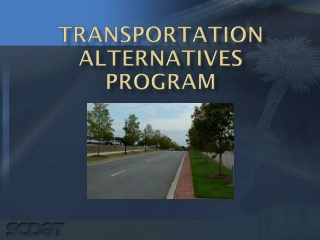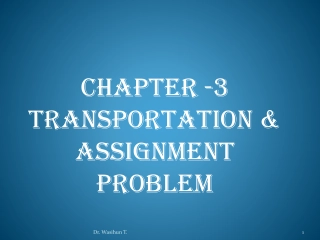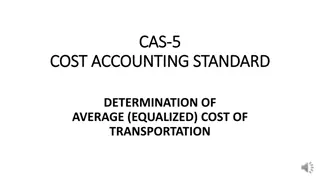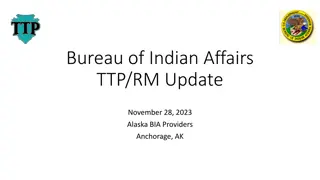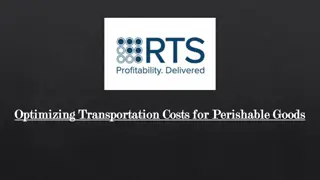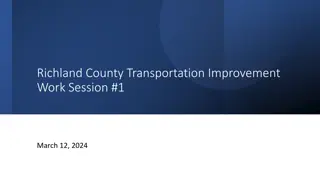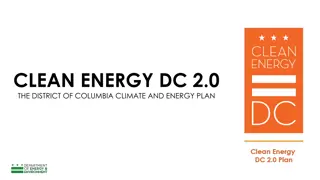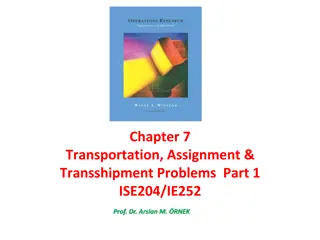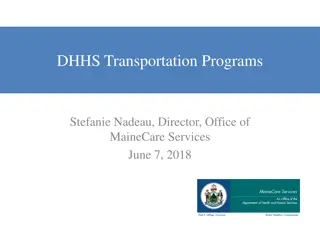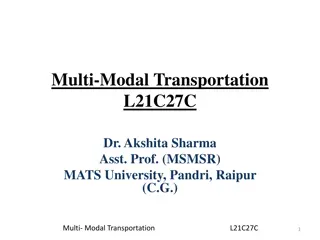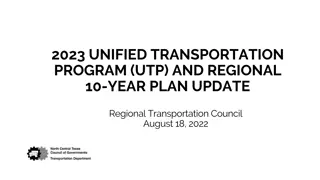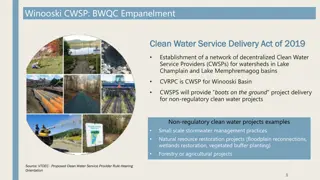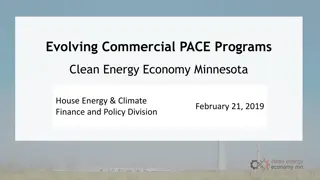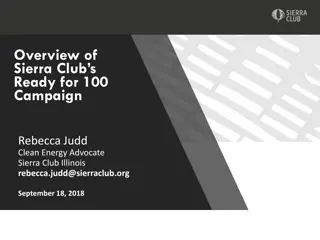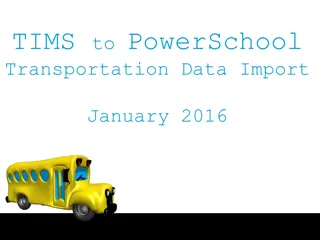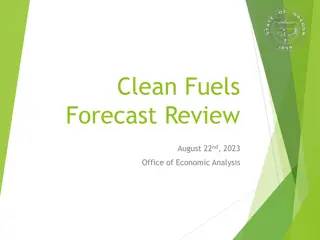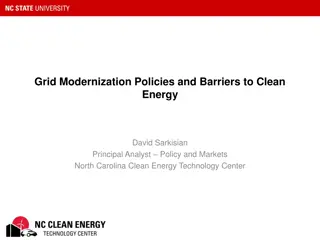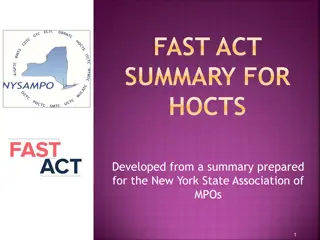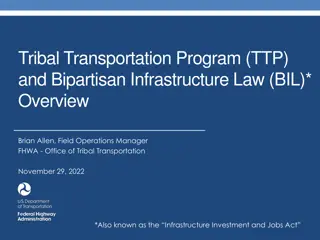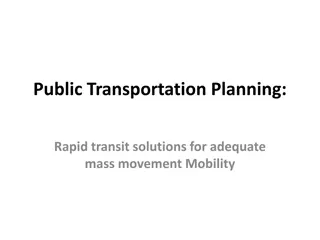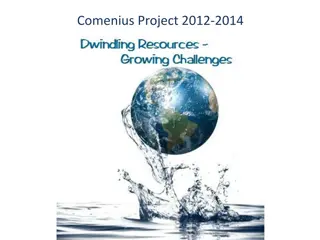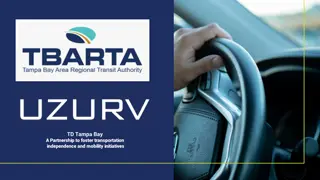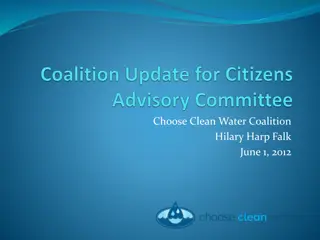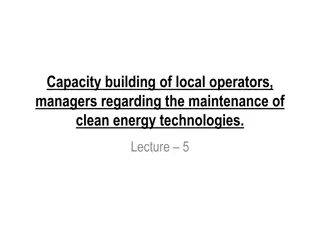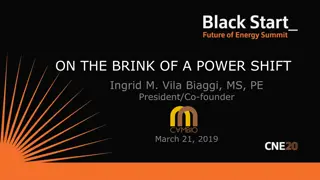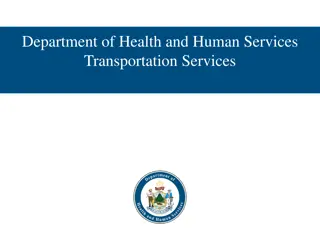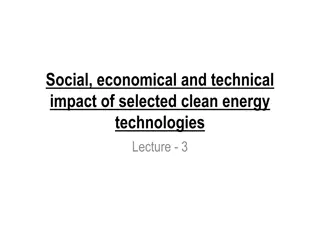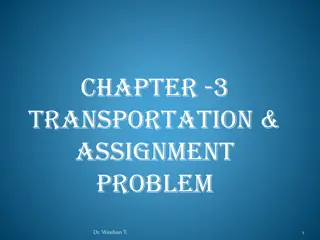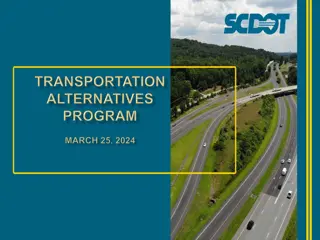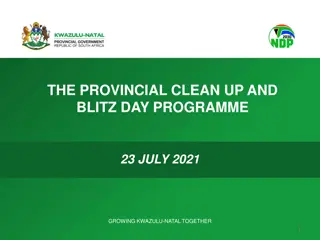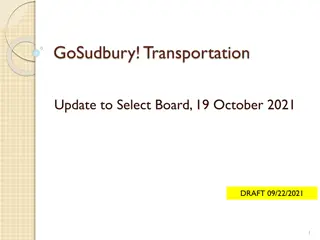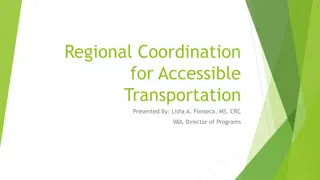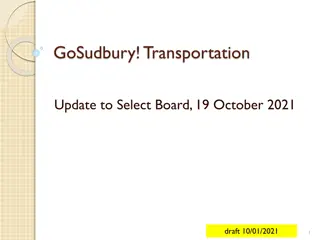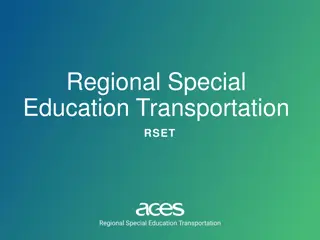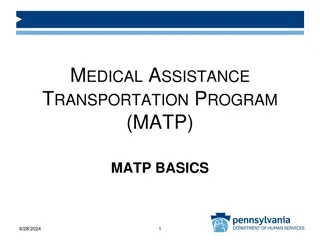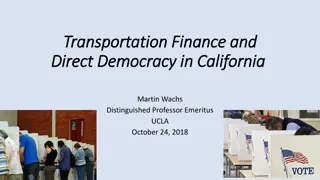Funding Opportunities for Non-Motorized Transportation in South Carolina
The US Department of Transportation's Federal Highway Administration provides funding to South Carolina through the Transportation Alternatives Program (TAP) to support non-motorized transportation initiatives. Local governments, schools, and other entities can partner with the South Carolina Depart
1 views • 21 slides
Transportation & Assignment Problem Overview
The transportation problem involves optimizing shipment costs from multiple sources to multiple destinations with known supply and demand constraints. This chapter discusses the characteristics of transportation problems, key assumptions, and how to formulate the transportation model. Dr. Wasihun T.
0 views • 64 slides
Enhancing Transportation Performance Management through TSMO Collaboration
Advancements in technology and evolving customer needs are driving changes in transportation management. Transportation Systems Management and Operations (TSMO) offers strategies to optimize operational performance, complementing traditional capacity projects. Collaboration between TSMO and Transpor
1 views • 77 slides
Cost Accounting Standards for Determining Transportation Costs
Understanding the importance of transportation costs in procurement and distribution, this guide outlines the standards for determining average costs, separation of transportation costs in accounting records, objectives for maintaining cost uniformity, components of transportation costs, and treatme
0 views • 11 slides
Update on BIA Transportation Programs in Alaska
The update covers the Bureau of Indian Affairs (BIA) Transportation Programs in Alaska, including funding details for the Tribal Transportation Program (TTP) and BIA Road Maintenance Program. It discusses the current funding status, upcoming appropriations, and maintenance activities on BIA-owned ro
0 views • 10 slides
Understanding Transportation Programs and Trends
Transportation training session led by Megan Johnson, featuring topics such as Transportation Crash Course, Training Opportunities, and Transportation Trends & Updates. Includes discussions on different types of transportation services and their importance for communities.
2 views • 38 slides
Optimizing Transportation Costs for Perishable Goods
In the realm of logistics, the transportation of perishable goods presents a unique challenge. From fresh produce to pharmaceuticals, these time-sensitive commodities require specialized handling and efficient transportation to maintain their quality and integrity. One of the critical aspects of man
2 views • 6 slides
Richland County Transportation Improvement Summary
Richland County's transportation improvement work includes sessions on project principles, funding options, project costs, and guidelines for utilizing the transportation penny. The focus is on addressing transportation needs, project prioritization, funding challenges, and division of funds for var
0 views • 19 slides
Clean Energy DC 2.0: Transformative Climate and Energy Plan for the District of Columbia
Clean Energy DC 2.0 is a comprehensive plan aimed at achieving carbon neutrality by 2045 in the District of Columbia. It focuses on technical and data-driven solutions to decarbonize energy, buildings, and transportation sectors. The plan emphasizes community involvement and equity, highlighting ben
2 views • 11 slides
Transportation Problem Modeling in Supply Chain Management
This content discusses the formulation and solution of transportation problems in the context of supply chain management, using a specific example of wheat transportation between grain elevators and mills. It covers the characteristics of transportation problems, linear programming model formulation
3 views • 55 slides
Transportation Planning and Data Collection Insights
Understanding transportation planning involves various stages such as data collection, study area definition, and selection of external cordon lines. Collecting data on existing travel patterns, transport facilities, and land use is crucial for formulating effective transportation plans. Defining th
0 views • 27 slides
Maine DHHS Transportation Programs Overview
The Maine Department of Health and Human Services (DHHS) oversees various transportation programs aimed at providing non-emergency transportation services to low-income, child welfare-eligible, and Section 17-eligible individuals. These programs are managed through regional brokerage systems, with b
3 views • 5 slides
Understanding Multimodal Transportation in Logistics
Multimodal transportation involves using multiple modes of transportation for logistics and freight processes. It utilizes a combination of air, road, rail, water, and package carriers to efficiently move goods. Unlike intermodal shipping, multimodal shipping allows for flexibility in handling cargo
2 views • 119 slides
Regional Transportation Council's 2023 Unified Transportation Program Update
The Regional Transportation Council discussed updates to the 2023 Unified Transportation Program, focusing on Category 2 funding discrepancies, proposed project adjustments, development principles for the 10-Year Plan, and regional funding allocations for 2017-2023 UTPs. The plan emphasizes performa
1 views • 14 slides
Establishment of Decentralized Clean Water Service Providers in Winooski Basin
The Clean Water Service Delivery Act of 2019 aims to establish a network of decentralized Clean Water Service Providers (CWSPs) for watersheds in Lake Champlain and Lake Memphremagog basins. CVRPC serves as the CWSP for the Winooski Basin, overseeing projects like stormwater management, natural reso
0 views • 5 slides
Advancing Clean Energy Economy in Minnesota
Evolving Commercial PACE Programs are enhancing Minnesota's clean energy business ecosystem. Clean Energy Economy MN (CEEM) focuses on promoting energy efficiency and clean energy to drive innovation and market expansion. Policy discussions highlight opportunities for businesses to access clean ener
0 views • 6 slides
Advancing Clean Energy Transition in Illinois: Sierra Club's Ready for 100 Campaign Update
Sierra Club's Ready for 100 campaign in Illinois highlights the progress in clean energy initiatives, such as utility-scale wind and solar projects, job creation, and the Future Energy Jobs Act. The focus now shifts to empowering local communities to lead the way towards achieving 100% clean, equita
0 views • 14 slides
Importing TIMS Transportation Data into PowerSchool
Explore the process of extracting, formatting, purging, and importing TIMS transportation data into PowerSchool for efficient management of student transportation information. This includes creating TIMS extracts, updating bus stop information, and optimizing transportation planning through geocodin
2 views • 43 slides
Green Valley Green Committee: Keeping Our Neighborhood Clean and Green
The Green Valley Green Committee is dedicated to maintaining a clean and green neighborhood. Their mission involves removing trash and debris, educating the community about waste prevention, restoring natural areas, and organizing clean-up events. Through programs like Earth Day Clean-Up and Green V
0 views • 9 slides
Clean Fuels Forecast Review - August 22nd, 2023 Summary
Reviewed in this forecast are the Committee's discussions on major policy changes and proposals, including Advanced Clean Cars I & II, Clean Trucks Plan/Rules, Bipartisan Infrastructure Law, Inflation Reduction Act, Washington Clean Fuel Standard, and Portland Renewable Fuel Standard. The Oregon Dep
0 views • 29 slides
Grid Modernization Policies and Barriers to Clean Energy Overview
Explore the efforts of the NC Clean Energy Technology Center in advancing sustainable energy practices, policies, and technologies. Learn about grid modernization, barriers to clean energy, and solutions to enhance access to wholesale markets and promote clean energy initiatives.
0 views • 19 slides
Overview of FAST Act for Transportation Planning
The FAST Act, passed in 2015, authorizes federal programs for transportation development with a focus on surface transportation. It extends funding through 2020, totaling $304.7 billion. The Act aims to enhance resiliency, reliability, and stormwater mitigation in transportation systems. Planning fa
2 views • 10 slides
Tribal Transportation Program & Bipartisan Infrastructure Law Overview
The Tribal Transportation Program (TTP) and Bipartisan Infrastructure Law (BIL) provide funding for essential transportation projects in Tribal communities. The TTP Bridge Fund, Safety Fund, and High Priority Projects aim to improve infrastructure and safety. The BIL funding for FY22-FY26 totals $3.
1 views • 13 slides
Efficient Public Transportation Planning for Mass Mobility
Rapid transit solutions like high-capacity public transportation systems, including overground rail, underground rail, trams, and BRT systems, play a crucial role in enhancing mass movement efficiency. Factors such as journey time, transport costs, vehicle operating costs, and the benefits of rapid
1 views • 20 slides
Understanding the Importance of Clean Water: Insights from Europe
Explore the significance of clean water through the lens of various European countries like Germany, Scotland, and Estonia. Delve into the origins of clean water sources, the European Water Charter's principles, and the essential treatment processes involved. Gain insights into the key points of the
0 views • 14 slides
TD Tampa Bay - Enhancing Transportation Independence and Mobility Initiatives
TD Tampa Bay partnership aims to increase access to essential services, enhance regional connectivity, and provide on-demand transportation services for transportation disadvantaged individuals in the TBARTA region. The initiative includes innovative solutions like cross-county and evening/weekend t
1 views • 9 slides
Coalition for Clean Water: Advocating for Chesapeake Bay Restoration
The Choose Clean Water Coalition, led by Hilary Harp Falk, is a diverse group of over 230 organizations working towards restoring rivers and streams in the Chesapeake region. Their mission includes coordinating policies and actions at all levels to ensure clean-up success. With a vision of vibrant,
0 views • 25 slides
Capacity Building on Clean Energy Technologies for Sustainable Development
This course delves into the management of micro-level clean energy projects, focusing on project organization, selection of sustainable technologies, financial analysis, and barriers. It emphasizes affordable, reliable, and accessible clean energy solutions, while empowering consumers and promoting
0 views • 23 slides
Embracing Paradigm Shift Towards Distributed Power and Clean Energy
The paradigm shift towards distributed power and clean energy brings about a transformative future where individuals play an active role, leading to a society with a stronger local economy integrated globally through innovative exchanges. Technology empowers users to create content and participate i
0 views • 5 slides
DHHS Coordination of Transportation Service Contracts Overview
The Department of Health and Human Services in Maine conducted an assessment of Transportation Services in June 2019. The workgroup identified three main priorities: alignment of Quality and Performance Measures, Safety Measures, and Evaluation of Transportation Services. The first priority involves
0 views • 28 slides
Social, Economical, and Technical Impact of Clean Energy Technologies
This course covers the management of micro-level clean energy projects, emphasizing the social, economic, and technical impacts of selected clean energy technologies. It discusses project organization, tools, project life cycle, financial analysis, barriers, capacity building, and more. It delves in
0 views • 32 slides
Understanding Transportation and Assignment Problem
Transportation and assignment problems involve optimizing the shipment of goods from various sources to multiple destinations while minimizing total transportation costs. These problems deal with limited supply, known demand, constant shipping costs, and integer quantities. The transportation algori
0 views • 64 slides
Enhancing Transportation Infrastructure Through Federal Funding Programs
The Transportation Alternatives Program (TAP) funded by the USDOT's Federal Highway Administration supports transportation projects in South Carolina based on population categories. TAP funds are allocated to Transportation Management Areas (TMAs), Small Urban Areas, and Non-Urban Areas, prioritizin
0 views • 21 slides
Provincial Clean Up and Blitz Day Programme in KwaZulu-Natal on July 23, 2021
The Provincial Clean Up and Blitz Day Programme in KwaZulu-Natal brings together various districts for clean-up activities on July 23, 2021. Different meeting points and contact persons are specified for each district participating in the clean-up campaign. The program includes activities in Umgungu
0 views • 14 slides
Addressing Transportation Gaps in Sudbury: A Livable Community Approach
The Sudbury Transportation Committee, established by the Select Board, aims to enhance transportation in Sudbury to create a livable community. Focusing on inclusivity, equity, and addressing transportation gaps impacting various aspects of livability, the initiative seeks to improve social particip
0 views • 16 slides
Understanding Regional Coordination for Accessible Transportation
This presentation delves into the concept of regional coordination in accessible transportation, focusing on the Regional Transportation Advisory Panel, 5-year regional transportation goals, and the significance of the Safe, Accountable, Flexible, Efficient Transportation Equity Act. It emphasizes t
0 views • 16 slides
Enhancing Livability in Sudbury Through Transportation Initiatives
The GoSudbury! Transportation Update to the Select Board on October 19, 2021 highlights the importance of addressing transportation as a key component of livable communities. The initiative aims to create a safe, secure, and inclusive environment by improving transportation options for residents of
0 views • 26 slides
Regional Special Education Transportation (RSET) Program Overview
RSET, which stands for Regional Special Education Transportation, is an initiative developed by ACES to help districts save money while safely transporting students to out-of-district placement sites. The program benefits districts by reducing transportation costs, addressing parent concerns, and ma
0 views • 13 slides
Understanding Pennsylvania's Medical Assistance Transportation Program (MATP)
The Medical Assistance Transportation Program (MATP) in Pennsylvania provides essential transportation services to access medical care. Governed by state plans and codes, MATP aims to offer access to medical, pharmacy services, chronic disease management, and preventative care. Transportation provid
0 views • 16 slides
Transportation Finance and Direct Democracy in California
Proposition 6 on November 6th has garnered attention, but voters in multiple states will decide on over 250 transportation ballot measures totaling over $55 billion. California, with a longer history and greater funding needs, has been at the forefront of transportation investments, including the us
0 views • 29 slides
